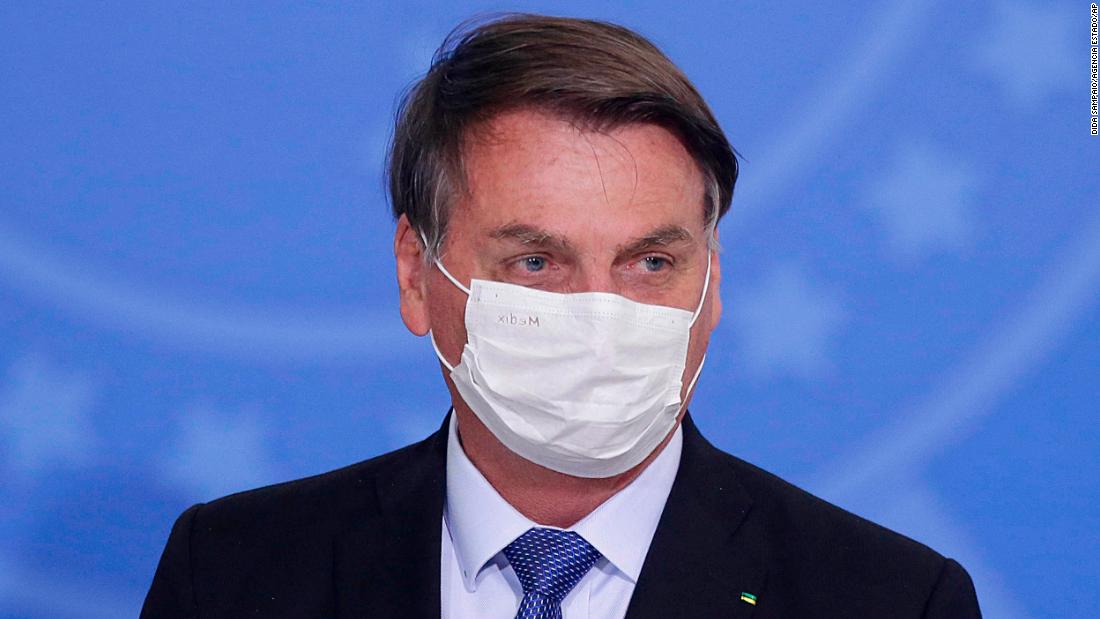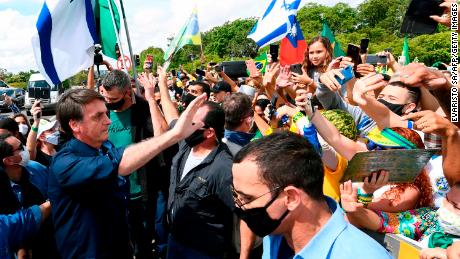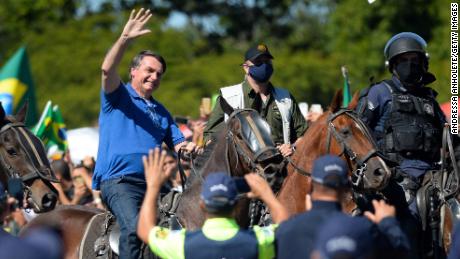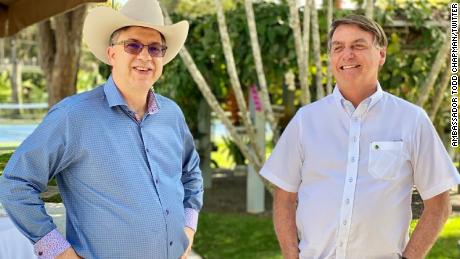Bolsonaro himself announced the result, speaking on Brazilian TV channels Tuesday. “Everyone knew that it would reach a considerable part of the population sooner or later. It was positive for me,” he said, referring to the Covid-19 test he took Monday.
“On Sunday, I wasn’t feeling very well. On Monday, it got worse when I started feeling tired and some muscle pain. I also had a 38-degree [Celsius] fever. Given those symptoms, the presidential doctor said there was suspicion of Covid-19,” Bolsonaro said, adding that he then went to hospital to receive a lung scan.
He said that his wife, First Lady Michelle Bolsonaro was also tested.
In an interview with CNN Brasil following his diagnosis, Bolsonaro said he would steer clear of in-person meetings in the near future. “I’m not going to see anyone for meetings. Everything will be done via video conference and I will rarely meet people if I need to deal with more reserved matter,” he said.
He also acknowledged the grave risk posed by a virus that he has in the past dismissed as just a “little flu.” “We know the fatality of the virus for those of a certain age, like me, above 65, as well as for those with comorbidities, diseases, other issues. In those cases, the virus could be decisive and lead to death — everyone knew that,” he said.
“You can’t get very close [to me], OK? Recommendation for everyone,” he said.
‘I thought I had contracted it already’
Brazil is second only to the United States in numbers of coronavirus infections and deaths. But Bolsonaro has often appeared in public and at rallies without a face mask, even hugging supporters.
“I have to admit, I thought I had gotten it earlier, considering my very dynamic activity in the face of the people,” he said on Tuesday. “And I can tell you more, I am the President and I am on the front line, I don’t run away from my responsibility nor do I shy away from the people.”
“Because of my contact with the people, I thought I had contracted it already and not noticed it, like the majority of the Brazilian population that contracts the virus, and doesn’t know,” he continued.
The Brazilian leader struck a defiant note during his interview with CNN Brasil, defending his government’s management of the pandemic.
“No country in the world has managed to prevent deaths,” he said. “The whole world was unanimous in saying that the purpose of the isolation measures… was not to prevent people from contracting the virus but that the contraction was inevitable and it should happen over a longer time for hospitals to be equipped with ICU beds and respirators.”
Bolsonaro has long maintained that lockdowns will hurt the country more than the virus itself. “Our life has to go on. Jobs should be maintained,” he said during a March 24 speech broadcast on national television and radio.
He held onto that position as Brazil’s outbreak dramatically worsened, criticizing governors and mayors for introducing stringent lockdown measures in an attempt to curb cases.
Local targets of his ire included the mayor of Manaus Virgílio Neto, to whom Bolsonaro referred as a “piece of shit” for digging mass graves in his city during the pandemic. Neto is now being treated for Covid-19 at a prominent São Paulo hospital, according to a statement from his office.
During a Facebook Live session last month, Bolsonaro also implied that local politicians might be inflating the number of deaths from coronavirus in order to make the federal government response look bad. “No one lost their life, in most cases, due to the lack of ICU beds or ventilators,” Bolsonaro said, calling on citizens to enter hospitals to check “if the beds are occupied or not.”
Following his diagnosis on Tuesday, Bolsonaro emphasized that mayors and governors were responsible for the handling of the pandemic. “If it is going well or is going badly, it is a responsibility of governors and mayors, according to a decision of the Supreme Court,” he told CNN Brasil.
Bolsonaro told CNN Brasil on Tuesday that he took both hydroxychloroquine and azithromycin while he awaited the result of his fourth Covid-19 test in four months, and credited the controversial drug for his well-being.
“I am feeling very well. I believe that the way they administered the hydroxychloroquine on, the effect was immediate,” he said.
The WHO on Tuesday wished Bolsonaro a “speedy recovery.” “It’s very important to understand the seriousness of this virus and to be really serious,” noted WHO Director-General Tedros Adhanom Ghebreyesus at a press briefing in Geneva.
“No country is immune, and no country is safe, and no individual can be safe.”
Contact-tracing the president
Bolsonaro has previously tested negative for coronavirus in at least three separate examinations. Those tests were administered between March 12 and March 17, after Bolsonaro returned from a bilateral meeting with US President Donald Trump in Florida and many in his entourage tested positive.
Images from the gathering show Bolsonaro not wearing a mask or observing social distancing. In one picture, he stands next to several US and Brazilian officials, including Chapman, and Brazil’s foreign minister, Ernesto Araújo. Chapman and his wife have Janetta Chapman have since tested negative for Covid-19, according to a statement tweeted by the US Embassy in Brazil.
Despite his diagnosis, Bolsonaro on Tuesday emphasized that his priority is still to restart Brazil’s lagging economy. “I know that nobody can recover from dying, but the economy not working leads to other causes of death and suicide,” he said. “We have suffered very harsh criticism in this regard, but today it shows that we are right. The fact that I am infected shows that I am a human being like any other.”
At the end of his comments, Bolsonaro stepped back and removed his mask. “I’ll get away a little. Just so you all can see my face. I’m fine, I’m fine, thank God. Everything is ok,” he said. “Thank you to those who prayed for me. Those who criticized, no problem, they can continue to criticize if they want. After all, we preserve the freedom of speech and understand it as one of the pillars of our democracy.”
He then resumed the assurances that have become a hallmark of his attitude toward the virus, “So let’s take special care of the elderly, of course. Younger people: take care, but if you are affected by the virus, be assured that for you, the possibility of something more serious is close to zero.”
With reporting contributed by Shasta Darlington in Sao Paulo; Taylor Barnes, Flora Charner and Claudia Dominguez in Atlanta; and Ingrid Formanek in Spain.







